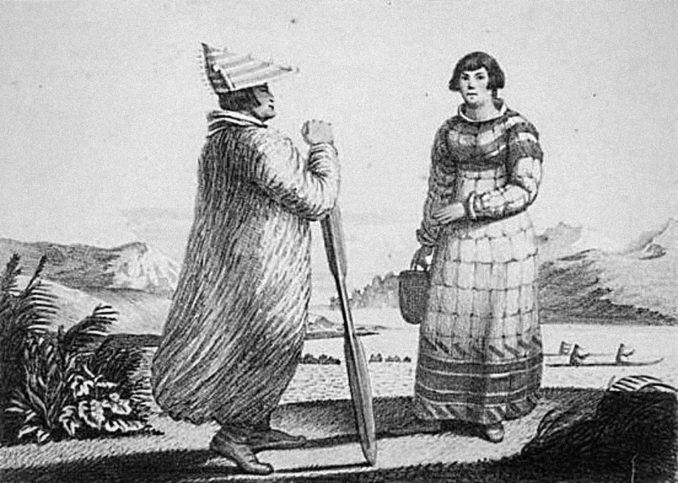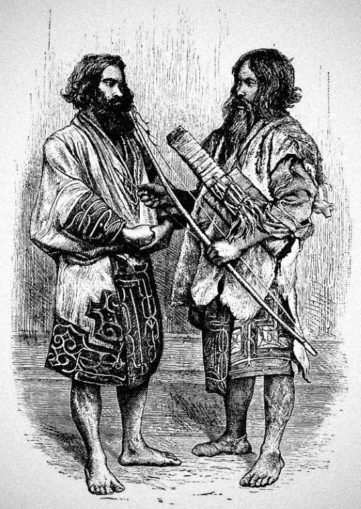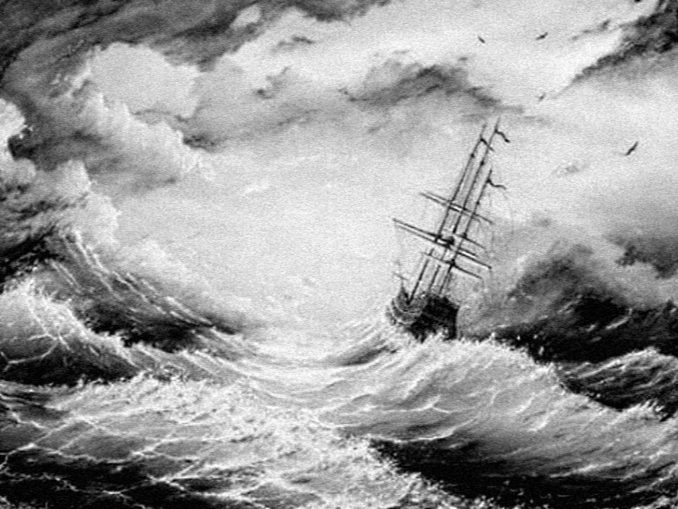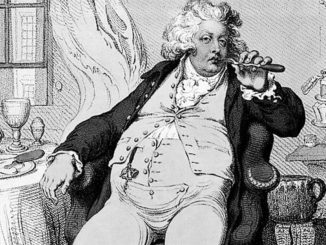August 28th, 1810 (August 16th O.S.).
Finally we are through the strait between Asia and America. After our long sojourn in a region where the chart shows only pictures of sea monsters, we are again in a place that has been surveyed, however inaccurately.
It has been a long haul, but once we were free of the ice we encountered no substantial obstacles beyond a few floes that had to be avoided. As these became less frequent, we halted at one to hack off ice to replenish our water supply. This we put in a spare sail to melt, and we now have fresh water aplenty. Nikita and Beaivi caught five seals, a welcome addition to our dwindling supplies of meat. The large store we have taken on board does not last long on a ship crewed by bears.
We are now within sight of the two small Diomede Islands that lie in the middle of the strait – and on a most significant day, because in the Old Style calendar this is the eighty-second anniversary of their first sighting by Vitus Bering in 1728. (Of course at this time England too was using the old calendar.) Like many islands, they are named after the saint on whose day they were discovered. St Diomedes was a Christian physician who died around A.D. 300 after arrest by the agents of the Emperor Diocletian. History does not recall the manner of his death, but having seen what the English agents of law and order do to the folk they arrest, I can hazard a guess. It is said that when the soldiers brought his severed head to the emperor, all who saw it were struck blind and did not recover their sight until the head was reunited with its body. He is revered as one of the Holy Unmercenaries – people who perform good acts without asking for payment – since he did not charge for his medical services.
For us too it is a day to celebrate: a successful voyage through the Northeast Passage. I believe that we are the first to complete this arduous course. As Ovid put it, Nos fragili vastum ligno sulcavimus aequor, We have ploughed the vast ocean in a fragile bark. I think it not immodest to claim that we could have not have done so without the aid of us ten bears, whose strength greatly supplemented the power of the human crew to overcome the many obstacles in our path.
Perhaps, when ships driven by steam engines have come into their own, it may be possible to use this route for commerce. A convoy led by a powerful and well armoured vessel to break through the ice would have a good chance of success, at least in a warm summer when the ice melts adequately. But it is far from an easy voyage, and I think that for some years trading vessels will be taking the old long course around Europe and Africa into the Indian Ocean, a hazardous route but less arduous that the one we have followed.
Count Bagarov and Master Ulyanov are agreed that we should not try to retrace our route to return to Archangel. By the time we were halfway through, winter would have set in and the ice would be advancing. Therefore we shall sail south and west, through the fabled Indies, and who knows what we shall find?
September 10th, 1810 (August 29th O.S.).
Sailing south, we have sighted some islands of the Catherine Archipelago, a chain of islands stretching between Russia and the Russian territory of Alaska on the American side. Rocky and treeless, they appeared at first to be uninhabited, but we saw smoke rising from a small settlement. We anchored and sent a boat ashore, with the Count, Fred and Jem, Bruin and myself.

We found a party of natives hunting sea otters, which are valued for their pelts. One of them spoke some Russian and, once he had recovered from his surprise at encountering a mixed party of bears and men, and had been gratified by the present of some steel knives, he told us that his people are called the Unangas. They scrape a living from the barren land which they supplement by selling otter pelts to the Russians, but in recent years the Russians have been cheating them by reducing the payment for these, and there has been violent conflict. (The Count wisely kept silent during this conversation. The natives do not know who we are, but assume that we are at least not Russians.)
We asked him whether there was a larger settlement where we could purchase supplies for our ship, and he told us that there was an island to the west called Atta, where there was a Russian town – but as he did so, he spat on the ground to show his contempt for the invaders.
Nevertheless we must head there, for after our long voyage we are running short of many of those essential things that keep a ship afloat – cordage, tar, gunpowder, salt meat and spirits – and must replenish them as far as we can from such remote outposts.
September 14th, 1810 (September 2nd O.S.).
We anchored in the harbour of Atta, the small town on the island of the same name. It is barely more than a village, but the trade in otter and seal pelts keeps it prosperous enough and we managed to restore our supplies to some extent. The good Count seems to have a limitless supply of Maria Theresia thalers, a currency recognised as genuine in the remotest parts of the world.
The local Russians call the native people Aleuts and despise them as savages, while they rely on them to supply the furs they deal in. It is plain that anger on both sides is still burning after the battles of twenty years ago.
We were glad to up anchor and sail away from this miserable place.
September 30th, 1810 (September 18th O.S.).
We have made good progress with a following wind driving our ambling vessel as fast as she will go down a chain of small islands flanking the east coast of the mainland, and are now arrived at the northernmost large island of Japan, which our chart names as Hokkaido. Knowing nothing of this mysterious kingdom, we put in at the first bay where there seemed to be a reasonable anchorage and signs of human habitation.
Here we were greeted not by anyone who met our expectations of what Japanese people would look like, but by a group of beetle-browed, heavily bearded men whose eyes suggested a European rather than an oriental heritage. They wore long garments decorated with bold geometric patterns. We did not know what to make of them, nor they of us – but the fact that our landing party included four bears provoked more than the usual attention, and we sensed a certain reverence in them.

The usual scrabble for mutually intelligible languages ensued. One of the people spoke a certain amount of Malay – evidently he had been a sailor in regions to the south where this is a lingua franca – and so did Misha, one of the Russian sailors who had also served thereabouts.
In this way we discovered that these people call themselves the Ainu, and they are the original inhabitants of the northern part of Japan and the islands we had just passed. The Japanese who have taken control of Hokkaido regard them as worthless savages and treat them with disdain, and have driven them into corners of the island.
We were invited to their village, where we were surprised to find that their womenfolk appeared to have luxuriant moustaches. On closer inspection, these were revealed to be black tattoos around the mouth, which are considered beautiful ornaments by these people.
We also discovered that they view bears as sacred – but, as so often with humans, this regard cuts both ways, for they also hunt bears and sacrifice them to their gods. As visitors in companionship with humans we are safe from persecution, but we do not feel at ease here. However, a performance of dances in the village left them mightily impressed, and all is harmonious for the time being.
I am concerned for Dolores, who must be approaching the time when she gives birth. She is hopping around as merrily as the rest of the crew, but I sense that her fortitude masks a most uncomfortable heaviness.
October 9th, 1810 (September 27th O.S.).
We had been pursuing our southwesterly course with a fair wind for several days, but this afternoon the wind changed rapidly, at first to easterly and then backing to the south, while black clouds were evident ahead. It was clear that a storm was approaching. Knowing nothing of these latitudes or longitudes, we thought it wise to prepare for the worst eventuality.
Master Ulyanov ordered us to strike all sails except main and fore topsails, a task that took some time as the wind freshened. We also brought out a storm trysail from the locker. This is a small fore-and-aft sail which is attached to the mainmast and used to keep a ship under way when the wind is so strong that no other sail can stand.
We have battened down the hatches – that is, we have laid timbers across them and lashed these to the cleats on the deck – tied down the boats, rigged lifelines along the deck, and made whatever other preparations we can. In Virgil’s words, Quo fata trahunt, retrahuntque, sequamur, Let us go wherever the fates drive us or drive us back. I will now stop writing and wrap this journal securely in oilcloth.
October 10th, 1810 (September 28th, O.S.).
What a night it has been! As evening approached the wind, already strong, increased to a gale, and then beyond a gale to unimaginable force. Waves towered mast-high, and we laboured up toward the crest, paused for a moment in the shrieking, foaming confusion at the summit, and slid back into the valley on the other side. The ship rolled until sometimes she was almost on her beam ends, but the sturdy vessel always dragged herself upright.
We had reefed the sails as far as they would go, and soon had to take them in entirely and rely on the single storm trysail to give us as much way as we needed to steer the ship and keep her head into the wind. We were all fearful that even this tiny scrap of canvas would carry away and leave us wallowing and foundering in the gigantic waves.

As the sun set invisibly behind the stormclouds, Angelina told me that I was needed below. It took only a glance and a sniff at Dolores to know that she was in labour, perhaps induced by the battering that we were all receiving in the wildly rolling vessel. The five female bears, Angelina, Mary, Emily, Beaivi and myself rallied to assist her at this most difficult of times in the most hazardous of situations. We lashed her securely to a cot while we held on to any support we could find as the cabin tilted crazily one way and the other.
I had not witnessed a human birth before, and was astonished at how arduous it was, and how painful for the mother. The human frame seems so ill adapted for childbirth that it is a wonder that the human race has contrived to multiply. Dolores is as courageous as any warrior, but even she could not restrain her shrieks as the birth pangs racked her, and I was reminded of the meaning of her name. However, as Aeschylus said, Οἱ δὴ στεναγμοὶ τῶν πόνων κουφίσματα, Lamentations are a sure relief of dolours.
Meanwhile, the raging storm suddenly subsided, and we found ourselves in a windless calm. Master Ulyanov came below and shyly poked his head around the corner, unwilling to intrude on this private scene. He said only, ‘Do not be deceived. We are in the eye of a circular storm. Soon it will blow again, as hard as before.’ Then he vanished.
It was during these few minutes of welcome relief that Dolores was delivered of a healthy baby boy. I knew enough to hold the infant upside down to clear his lungs and pat him gently on the back until he started crying, then I put him into the arms of his pale, bloody but triumphant mother. It was a moment of joy – but all too brief, as the wind was getting up again and we were needed on deck. I waited for just long enough to bite through the umbilical cord, then followed the other bears up.
As the storm resumed its raging, this time from the west, we were relieved to see that so far our ship had weathered the hurricane in reasonable order – or I should say the typhoon, as such events are termed in the Pacific, that ill named and unruly ocean. All the masts, yards and rigging were intact, but one of the three boats had been torn from its lashings and had gone overboard. The storm trysail was tattered but holding. We prepared for another onslaught – and it came, even harder than before.
When folk are in peril niceties may be dispensed with, but not essentials. In case we should perish in the renewed tempest, it was necessary for the boy to be christened, and Master Ulyanov exercised his privilege to perform the baptism according to what he could remember of the Orthodox rite. At my suggestion we named him Aeolus for the god of the winds, and his second name was Jeremy after his father. I am sure that a just God will forgive us any deficiencies in the ritual.
I write this in the small hours of the morning, as the typhoon is subsiding into no more than an ordinary rough sea, which seems like a flat calm after what we have endured. We have weathered the storm with no further damage, and have even managed to hoist topsails again and continue on our way.
Mother and baby are well. There is further good news: Dmitri was not seasick at all during the storm, and is at last managing to pull his weight with the rest of the crew.
Copyright © Tachybaptus 2019
The Goodnight Vienna Audio file
Audio Player


